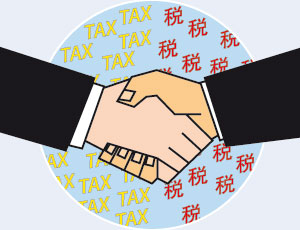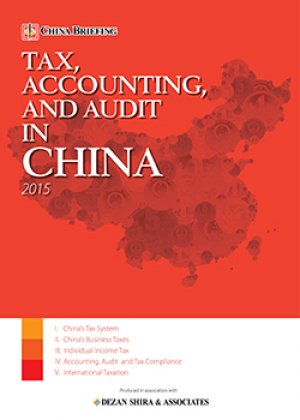China to Roll Back Local Tax Incentives for Foreign Investors
 By Rainy Yao
By Rainy Yao
In December last year, the Chinese government released a circular that requires all the local governments to roll back their regional tax incentives (including subsidies and discounted land and utility fees) for foreign companies. The circular further stipulates that local governments are no longer allowed to offer regional tax incentives or preferential land policies without permission from the State Council. Any changes to the tax rates must be enacted in a law promulgated by the National People’s Congress (NPC). All the local governments and relevant departments need to report to the Ministry of Finance (MOF) with the detailed overviews of the preferential policies by the end of March 2015.
Currently, foreign enterprises including Foxconn, the world’s largest electronics manufacturer, are negotiating with local governments to keep previously promised subsidies. China’s Minister of Finance Lou Jiwei stated that the move is made to create a fair market and investment environment for both domestic and foreign enterprises. Local governments are thus urged to improve their city infrastructures and provide investors with better services. Another possible reason for the disappearing incentives, however, might be that China is now facing a slowdown in tax revenues and massive local debt, along with a slower economic growth. With the uncertainty of local incentives, foreign investors are suggested to review all the contracts signed by local government officials and reconsider the right location for their business.
 RELATED: Tax and Compliance Services from Dezan Shira & Associates
RELATED: Tax and Compliance Services from Dezan Shira & Associates
During the last three decades, foreigners were drawn to China because of various tax incentives and fiscal support provided by the Chinese government. Specifically, foreign companies that engaged in manufacturing industry and have their offices established in China’s Special Economic Zones including Shenzhen, Zhuhai and Xiamen used to pay the corporate income tax (CIT) at a reduced rate of 15 percent (10 percent for eligible exporters); foreign companies that are established in China’s remote areas were given a temporary exemption from tax payment. Apart from these, five-year CIT breaks, 100 percent CIT refund for reinvestment of profits, and the exemption of withholding tax on dividends remitted abroad have long served as the driving force of foreign investment in the country. Panasonic, together with Coca-Cola and Boeing, came to China in 1979 as the pioneers in Chinese market. This was followed to great success by numerous foreign companies such as Microsoft, Starbucks and KFC.
However, with a new Corporate Income Tax Law released in 2008, China implemented a uniform 25 percent CIT rate for both domestic and foreign companies. Meanwhile, all types of preferential land policies were abolished. As a result, local governments rolled out their regional tax incentives exclusively for foreign investors to retain foreign investment in their areas for GDP growth.
Companies doing business in China are subject to numerous taxes, including a CIT at 25 percent and a withholding tax on dividends, interest and royalties, all of which are 10 percent. They are also subject to a value added tax (VAT) of between 13 and 17 percent and a business tax (BT) of between three and five percent on companies. At the start of 2012 however, China launched a massive reform to replace BT with VAT, which is expected to eliminate the risk of double taxation and reduce the tax burden for companies.
|
Asia Briefing Ltd. is a subsidiary of Dezan Shira & Associates. Dezan Shira is a specialist foreign direct investment practice, providing corporate establishment, business advisory, tax advisory and compliance, accounting, payroll, due diligence and financial review services to multinationals investing in China, Hong Kong, India, Vietnam, Singapore and the rest of ASEAN. For further information, please email china@dezshira.com or visit www.dezshira.com. Stay up to date with the latest business and investment trends in Asia by subscribing to our complimentary update service featuring news, commentary and regulatory insight. |
![]()
 Tax, Accounting, and Audit in China 2015
Tax, Accounting, and Audit in China 2015
This edition of Tax, Accounting, and Audit in China, updated for 2015, offers a comprehensive overview of the major taxes foreign investors are likely to encounter when establishing or operating a business in China, as well as other tax-relevant obligations. This concise, detailed, yet pragmatic guide is ideal for CFOs, compliance officers and heads of accounting who must navigate the complex tax and accounting landscape in China in order to effectively manage and strategically plan their China operations.
 Strategies for Repatriating Profits from China
Strategies for Repatriating Profits from China
In this issue of China Briefing, we guide you through the different channels for repatriating profits, including via intercompany expenses (i.e., charging service fees and royalties to the Chinese subsidiary) and loans. We also cover the requirements and procedures for repatriating dividends, as well as how to take advantage of lowered tax rates under double tax avoidance treaties.
 Adapting Your China WFOE to Service China’s Consumers
Adapting Your China WFOE to Service China’s Consumers
In this issue of China Briefing Magazine, we look at the challenges posed to manufacturers amidst China’s rising labor costs and stricter environmental regulations. Manufacturing WFOEs in China should adapt by expanding their business scope to include distribution and determine suitable supply chain solutions. In this regard, we will take a look at the opportunities in China’s domestic consumer market and forecast the sectors that are set to boom in the coming years.
- Previous Article China Eases Currency Controls, Allowing Free Exchange of Foreign Currency Capital
- Next Article The New Free Trade Zones Explained, Part II: The Negative List









